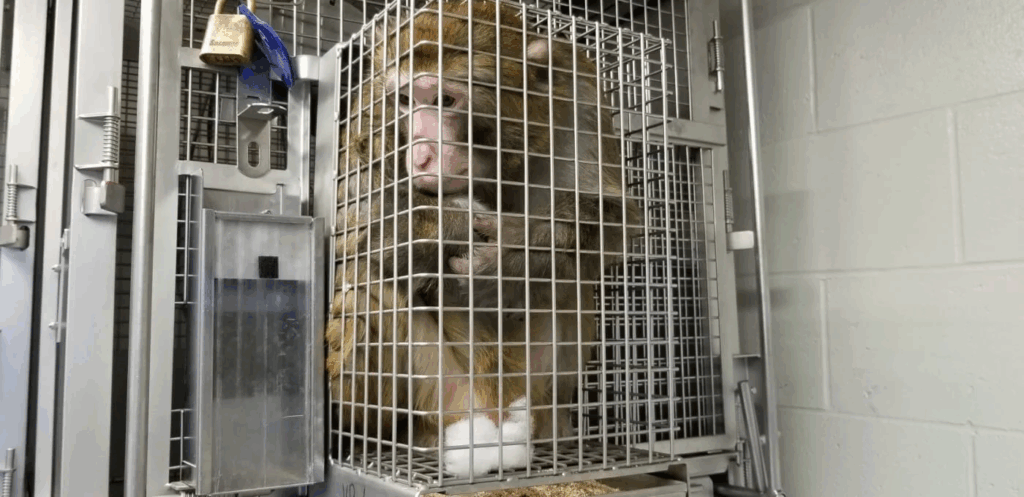At Sustainable Action Now, our commitment to a humane and sustainable future extends to every living creature. Today, we bring to light deeply disturbing revelations from within the confines of a Massachusetts General Hospital laboratory, exposing a stark reality that demands immediate attention and systemic change. Never-before-seen footage has emerged, pulling back the curtain on a facility where monkeys, rabbits, pigs, and rodents are subjected to surgical mutilation and driven to madness in cruel, often pointless, experiments.

This isn’t merely about discomfort; it’s about profound suffering. The shocking visuals reveal a world where highly intelligent and sensitive animals endure agonizing procedures, often resulting in deep wounds, exposed tendons, and debilitating psychological distress. Monkeys are seen rubbing their chins raw, biting their own arms, pacing relentlessly, circling, rocking, and banging against cage walls – all heartbreaking indicators of the immense mental and physical toll inflicted by their confinement and the experiments themselves. After violent encounters with other agitated animals, some are left with severe puncture wounds and lacerations, yet their suffering continues within these sterile, unforgiving environments.
These animals are confined to windowless rooms, deprived of natural light and airflow, subjected to constant, frightening noise. This stark reality is a far cry from the complex, stimulating environments their bodies and brains were designed to navigate. The PETA investigation, which brought this footage to light, emphasizes that what they uncovered at Massachusetts General Hospital is not an anomaly but a grim reality typical of animal experimentation laboratories across the nation.
Consider the ethical quandary: experimenters reportedly engage in procedures such as cutting out baboons’ organs and replacing them with those from genetically modified pigs, or subjecting monkeys to invasive bone marrow and stem cell transplants. One baboon, tragically, died during a heart transplant surgery and was subsequently decapitated. Other instances involve drilling into monkeys’ skulls to implant electrodes into their brains, with dried blood visible around the implanted devices. These are not isolated incidents but part of a systematic approach that raises profound questions about the ethics, efficacy, and necessity of such research.
The funding for these distressing practices is staggering. In 2024 alone, Massachusetts General Hospital reportedly received hundreds of millions from the National Institutes of Health, with a significant portion allocated to animal experimentation. Yet, despite this massive investment, critics consistently highlight that animal research often fails to reliably predict human outcomes. Studies have shown that over 95% of drugs proven safe and effective in animal trials fail in human trials, leading to immense waste of resources and countless animal lives.
At Sustainable Action Now, we believe that true scientific progress must align with ethical responsibility. The suffering observed in these laboratories underscores the urgent need to redirect resources towards cutting-edge, non-animal research methods that are more human-relevant, effective, and humane. Advances in in-vitro testing, computational modeling, and human-based cell systems offer promising avenues for medical breakthroughs without inflicting pain on sentient beings.
It is time to move beyond outdated practices and embrace a future where scientific advancement and compassion are not mutually exclusive. We call upon research institutions, funding bodies, and policymakers to recognize the immense suffering caused by these experiments and to pivot decisively towards humane, non-animal alternatives. Every life holds value, and no animal should endure such torment for curiosity-driven research that often yields little human benefit.
Join us in advocating for a world where innovation thrives without cruelty. To learn more about the critical issues surrounding animal testing and discover how you can contribute to a more compassionate scientific landscape, please visit our Animal Testing section on Sustainable Action Now.

